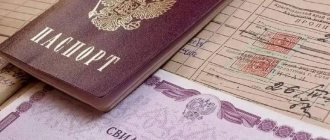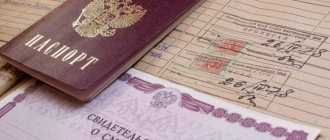Content:
- Transporting the deceased to the morgue
- Medical report from the morgue
- Registration of a death certificate
- Death in another country or city
- Receiving burial benefits
- Certificate of burial
- Registration of inheritance
When faced with the loss of a loved one, not everyone knows what to do in such a situation, what documents need to be drawn up after death, or how to properly organize a funeral ceremony. In moments of trouble, it is easy to get confused, because many papers should be collected in the first days after death. In this article, we tried to collect for you the most important information on preparing for a burial and tell you about all the features of preparing documentation for a funeral.
Will's ambiguity
If the meaning of the will is unclear or contains several interpretations, then the heirs need to go to court.
Example. After the woman's death, a will was discovered. The woman bequeathed her apartment to her daughter and son in equal shares. When registering the inheritance, it was revealed that the property belonged to the deceased and her husband. The court considered that literal execution of the will was impossible. A woman could not independently manage joint property. Children could inherit only on her share of the property.
Transporting the deceased to the morgue
If a person died at home, immediately after death the relatives need to call an ambulance and the police. Upon arrival, the staff will inspect the body and provide several documents that will be required later when organizing the funeral. Emergency doctors write out inspection and death certificates, and law enforcement officers write out a body examination protocol. If the police have doubts about the cause of death, the deceased may be taken for a forensic examination. If a violent death is discovered, a criminal case will be initiated. If a person dies naturally, a decision is made to refuse to initiate a case. In any case, the body can be collected only with written permission from the prosecutor's office or the police.
Priority actions for the person who finds the body
It doesn’t matter whether you have found the lifeless body of a relative or even a complete stranger, the first thing you should do is contact emergency services. Ambulance numbers “103” and law enforcement numbers “102” are dialed the same way from landline and mobile phones. Report the incident to dispatchers, identify yourself and the locality where the tragedy occurred. Next, your appeal will be transmitted through their own channels and duty teams from the nearest regional center will go to the site.
Calling a ritual agent
city funeral service
Documents for burial
according to the legislation of the Russian Federation
Funeral arrangements
in St. Petersburg and the region
Be sure to wait for emergency personnel to arrive. Under the protocol, report the circumstances of the discovery of the deceased, if you know, then his personal data and which of his relatives can be contacted promptly. It would be even better to contact the household of the deceased before the police and doctor arrive, of course, if you have their contact number. If there are witnesses to the tragedy that occurred, it is highly desirable that they also give their testimony. Or at least those people who, like you, accidentally discovered the deceased.
After drawing up a protocol and a preliminary diagnosis of death, the corpse is sent to the morgue. Take the time to write down in which locality the body will be kept until burial. This will greatly oblige the relatives of the deceased. If the death occurred under unclear circumstances or there is a suspicion of violence, albeit unintentional, poisoning, etc., then the deceased will be sent to the forensic morgue. In this case, an autopsy is mandatory and no reasons, including religious ones, can prevent this.
Registration of a death certificate
The mandatory list of documents after death includes a certificate from the registry office, which confirms the death of a person. It is drawn up on stamped paper and provided to relatives free of charge. To obtain a certificate, you must visit the registry office with the following package of documentation:
- passport of the responsible person;
- medical certificate of death from the morgue;
- ID of the deceased;
- application in form No. 16 (drawn up at the registry office when issuing a certificate).
The document is issued on the same day of application. Recipients can be relatives or legal representatives. Based on this, further preparations for the burial can be carried out. The paper will be required when registering a grave in a cemetery, carrying out cremation, receiving benefits and payments for burial, as well as when entering into inheritance rights.
Extension of deadlines
The period for entering into an inheritance can be extended through a judicial procedure. Grounds for going to court:
- the presence of a serious illness in the heir;
- business trip to another country;
- living abroad;
- being in prison;
- lack of information about the death of the testator.
In some cases, the deadline for accepting an inheritance can be extended by agreement between the heirs (Article 1155 of the Civil Code of the Russian Federation). The written consent of the heirs who have assumed their rights is the basis for canceling a previously issued certificate and issuing new documents to applicants.
Sample application for inclusion of a legal successor in the list of heirs
Death in another country or city
The death of a person in another city or state is a separate case that requires the collection of a large package of documentation according to the characteristics of the region. As a rule, the hospital where the deceased died is responsible for issuing a medical certificate in such a situation. To deliver the deceased to his hometown, you will need to organize the transportation of “cargo-200”. For such a service, it is advisable to contact specialized funeral companies.
To transport a body by plane, you must prepare the following documentation:
- death certificate;
- certificate of embalming;
- SES certificate;
- a document confirming the absence of foreign objects in the coffin;
- ID card of the accompanying person.
In the event of death abroad, all questions regarding transportation are taken over by the consulate. For transportation, you will need the deceased's passport, his visa (if available), and a medical death certificate indicating that the person died abroad.
Time off on the occasion of the death of close relatives is paid or arranged at your own expense
An application for leave upon the death of a close relative serves as the basis for issuing an order for leave without pay. Issue the order on the State Statistics Service form T-6 or in a form developed independently by the company’s personnel officer or accountant, taking into account the requirements for the details established by law (clause 2 of Article 9 of the Law “On Accounting” dated December 6, 2011 No. 402-FZ). Introduce the order to the employee against signature.
Read about the procedure for filling out the State Statistics Service form T-6 here.
Since time off for a funeral is unpaid, the accountant does not draw up a note calculating the provision of leave.
In the time sheet, the accountant indicates the code:
- “OZ” or 17 - if time off is provided for the funeral of a family member in accordance with the Labor Code of the Russian Federation;
- “BEFORE” or 16 - if the manager allows time off due to the death of non-close relatives.
Read more about the procedure for maintaining timesheets in the material “Unified Form No. T-13 - Form and Sample.”
There is no need to include time off for funerals in your vacation schedule. But in the T-2 card or a similar form developed by the company’s human resources department/accounting department, information about leave at one’s own expense is recorded.
ConsultantPlus experts answered a number of questions about granting retroactive leave.
Find out an expert opinion on the employer's actions in such a situation by getting trial access to the system for free.
Receiving burial benefits
Any person who has assumed the responsibility for conducting a funeral has the right to receive social benefits from the state. Its size is set by local authorities and may vary in each region of the Russian Federation. Payments are made on the day of application based on the following documentation:
- application for benefits;
- death certificate;
- applicant's passport;
- death certificate;
- Bank details for transferring funds.
The application must be submitted no later than 6 months from the date of death. You should apply for benefits to the organization according to the status of the deceased. So, if a person was working at the time of his death, the funds are paid at the place of his employment. If the deceased was unemployed, the application is submitted to the social protection department at the place of registration, for pensioners - to the territorial division of the Pension Fund of the Russian Federation. The military commissariat is responsible for issuing benefits for military personnel.
Fine for failure to provide leave due to the death of a relative
Sending an employee on leave at his own expense in the event of the death of family members is the direct responsibility of the employer, established by Art. 128 Labor Code of the Russian Federation. Violation of this obligation is fraught with a fine for the company or merchant in accordance with Part 1 of Art. 5.27 Code of Administrative Offences:
- for a legal entity - from 30,000 to 50,000 rubles;
- for an official or entrepreneur - from 1,000 to 5,000 rubles.
If you repeatedly violate labor laws, the fines increase:
- for a legal entity - up to 70,000 rubles;
- for an official or businessman - up to 20,000 rubles. or disqualification of an official for a period of up to 3 years (part 4 of article 5.27 of the Administrative Code).
Read about the employer’s responsibility to his subordinates in the material “Art. 22 of the Labor Code of the Russian Federation: questions and answers.”
Registration of inheritance
If the deceased was the owner of a house or apartment, after his death the relatives need to enter into the rights of inheritance of property. Real estate and other valuables are transferred to loved ones by law or will. In both cases, the inheritance should be formalized within 6 months from the moment of transition to another world. To enter into inheritance, you must visit a notary and submit the appropriate application. Attached to the application:
- applicant's passport;
- death certificate;
- will (if any);
- an extract from the house register or personal account about the place of registration of the deceased;
- confirmation of kinship (in the absence of a will).
The application can be submitted in person or through a legal representative. In the latter case, a notarized power of attorney in his name will be required. In order for a notary to provide a certificate of inheritance, he must know what the deceased's property includes. For these purposes, title documents for real estate are attached to the application. In the case of a car, you need to have a vehicle passport, a car registration certificate, and a certificate of market valuation of the vehicle.
If you don’t know what to do after the death of a relative, what documents to collect for the funeral, contact the “Honest Agent” funeral service for help. Our specialists have extensive experience in organizing funeral events and are ready to take on all issues with documentation. We will help you quickly collect the necessary papers and conduct the burial of a deceased relative at a high professional level.
Tell your friends:
What assistance is available for the death of a military personnel and law enforcement officers?
The legislation defines cases when the amount of funeral benefits may differ from the established one. This is possible if compensation is paid from the funds of individual federal departments and executive authorities. They can be obtained if the deceased was:
- military personnel;
- participant in hostilities;
- an employee of the State Fire Service;
- veteran of the Great Patriotic War;
- employee of law enforcement agencies (Ministry of Internal Affairs, Ministry of Defense, penal authorities, etc.);
- blockade runner;
- home front worker.
Financial assistance to the relatives of a deceased law enforcement officer or military serviceman can be of three types, and applicants can only apply for one of them and provided that the funeral was organized at their own expense and not at public expense:
- social benefit for funeral;
- compensation payments for funeral expenses incurred;
- funeral benefit in the amount of three times the pension/salary.
Compensation for actual funeral costs
Close relatives can receive funeral payments in the amount of the established social benefit, the amount of which in 2019 is 5,701.31 rubles. If the funeral was carried out at his own expense, the applicant has the right to apply for reimbursement of expenses incurred by presenting documentary evidence. The refund amount will depend on the actual waste, but no more than 18,980 rubles (for Moscow and St. Petersburg - 26,280 rubles). If the deceased was a WWII veteran, the maximum is set at 32,803 rubles.
Funeral benefit in the amount of three months' pension or salary
If you refer to Government Decree No. 941 (09/22/1993), you can see that the death benefit for a relative from among the military, employees of internal affairs bodies, the State Fire Service and the penal system can be three times the monthly allowance (pension) on the date of death citizen. In total, this amount cannot be less than the amount of the social funeral benefit (in 2019 - 5,701.31 rubles)
Installation of a monument at the grave at the expense of the federal budget
In some cases, close relatives are entitled to reimbursement of expenses in connection with the installation of gravestones. Funds are allocated from local budgets and provided with documentary evidence of expenses incurred. Money allocated from the federal executive authorities where the deceased served cannot exceed 20% of the amounts established by law. Government Decree No. 460 (06.05.1994) sets out the following maximum amounts of compensation:
| Deceased status | Amount, rubles |
| Military personnel and other law enforcement officers | 32 803 |
| Veterans of military service and combat operations | |
| Participants and disabled people of the Second World War | |
| Conscripts, cadets | 26280 |
| Participants and disabled people of the Second World War (who did not serve as military personnel in the active army) |
Receiving compensation for Sberbank deposits
If the deceased had a deposit in the largest bank in the country, opened before June 20, 1991 and not claimed before December 31, 1991, the heirs have the right to receive compensation for it, but only if the depositor had Russian citizenship at the time of death. The amount of compensation depends on the date of birth of the beneficiary and is:
- up to 1945 (inclusive) – three times the balance;
- 1946–1991 – double the value.
Upon the death of the investor in 2021, his heirs or citizens who organized and paid for the funeral and funeral services are entitled to compensation. Its size depends on the balance of the deceased’s deposit in the bank, but cannot exceed an amount equal to 6 thousand rubles. To receive the above payments, you must submit an application indicating the date and your own signature. It should be accompanied by the necessary package of documents, the exact list of which should be clarified at the department.








